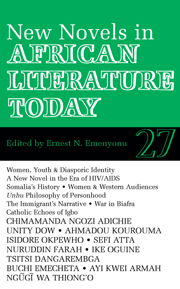Book contents
- Frontmatter
- Contents
- Notes on Contributors
- EDITORIAL ARTICLE: The African Novel in the 21st Century: Sustaining the Gains of the 20th Century
- ARTICLES
- Resurgent Spirits, Catholic Echoes of Igbo & Petals of Purple: The Syncretised World of Chimamanda Ngozi Adichie's Purple Hibiscus
- Ambivalent Inscriptions: Women, Youth & Diasporic Identity in Buchi Emecheta's Later Fiction
- The Interrupted Dance: Racial Memory in Isidore Okpewho's Call Me By My Rightful Name
- The Ivorian Crisis & Ahmadou Kourouma's Posthumous Political Novel Quand on Refuse on dit non
- Ngũgĩ's Wizard of the Crow: Women as the “Voice of the People” & the Western Audience
- The Ankh & Maat: Symbols of Successful Revolution in Ayi Kwei Armah's Osiris Rising
- A New African Youth Novel in the Era of HIV/AIDS: An Analysis of Unity Dow's Far & Beyon'
- The Prison of Nigerian Woman: Female Complicity in Sefi Atta's Everything Good Will Come
- Manufacturing Skin for Somalia's History: Nuruddin Farah's Deep Hurt in Links
- A Zimbabwean Ethic of Humanity: Tsitsi Dangarembga's The Book of Not & the Unhu Philosophy of Personhood
- ‘Coming to America’: Ike Oguine's A Squatter's Tale & the Nigerian/African Immigrant's Narrative
- Chimamanda Ngozi Adichie's Half of a Yellow Sun
- REVIEW
- Index
Ngũgĩ's Wizard of the Crow: Women as the “Voice of the People” & the Western Audience
from ARTICLES
Published online by Cambridge University Press: 05 April 2013
- Frontmatter
- Contents
- Notes on Contributors
- EDITORIAL ARTICLE: The African Novel in the 21st Century: Sustaining the Gains of the 20th Century
- ARTICLES
- Resurgent Spirits, Catholic Echoes of Igbo & Petals of Purple: The Syncretised World of Chimamanda Ngozi Adichie's Purple Hibiscus
- Ambivalent Inscriptions: Women, Youth & Diasporic Identity in Buchi Emecheta's Later Fiction
- The Interrupted Dance: Racial Memory in Isidore Okpewho's Call Me By My Rightful Name
- The Ivorian Crisis & Ahmadou Kourouma's Posthumous Political Novel Quand on Refuse on dit non
- Ngũgĩ's Wizard of the Crow: Women as the “Voice of the People” & the Western Audience
- The Ankh & Maat: Symbols of Successful Revolution in Ayi Kwei Armah's Osiris Rising
- A New African Youth Novel in the Era of HIV/AIDS: An Analysis of Unity Dow's Far & Beyon'
- The Prison of Nigerian Woman: Female Complicity in Sefi Atta's Everything Good Will Come
- Manufacturing Skin for Somalia's History: Nuruddin Farah's Deep Hurt in Links
- A Zimbabwean Ethic of Humanity: Tsitsi Dangarembga's The Book of Not & the Unhu Philosophy of Personhood
- ‘Coming to America’: Ike Oguine's A Squatter's Tale & the Nigerian/African Immigrant's Narrative
- Chimamanda Ngozi Adichie's Half of a Yellow Sun
- REVIEW
- Index
Summary
The writings of Kenyan author Ngũgĩ wa Thiong'o have consistently presented women characters, from his early novels Weep Not, Child (1964) and The River Between (1965) to his middle period works such as Petals of Blood (1977) to his Gikuyu works translated into English, including Caitanni Mutharaba-ini (1980), translated as Devil on the Cross (1982); and Matigari ma Njiruungi (1986), translated by Wangui wa Goro as Matigari (1989). Ngũgĩ's most recent novel, also written in Gikuyu, Murogi wa Kagogo (2004) or Wizard of the Crow (2006), is the culmination of his orature-based, satiric novelistic writings after a twenty-year period. A magnum opus, Wizard of the Crow demonstrates his portrayal of women characters in a number of ways. His principal woman character, Nyawira, meaning ‘work,’ is central to ‘the “Movement for the Voice of the People”’ (Wizard 82), the organization that resists the retrogressive policies of the ‘Ruler’ of the ‘Free Republic of Aburiria,’ the fictitious African state used to satirize problematic governments in the South and elsewhere. Nyawira's relationship with the Wizard is framed against her progressive political awareness.
One of the central questions is whether Ngũgĩ depicts women as tropes rather than as ‘real’ characters confronted with gender issues in domestic and public spaces. Does Ngũgĩ employ women to further his argument relating to the nation, implicitly Kenya, and the role women can play in national reconstruction?
- Type
- Chapter
- Information
- New Novels in African Literature Today , pp. 55 - 64Publisher: Boydell & BrewerPrint publication year: 2009



